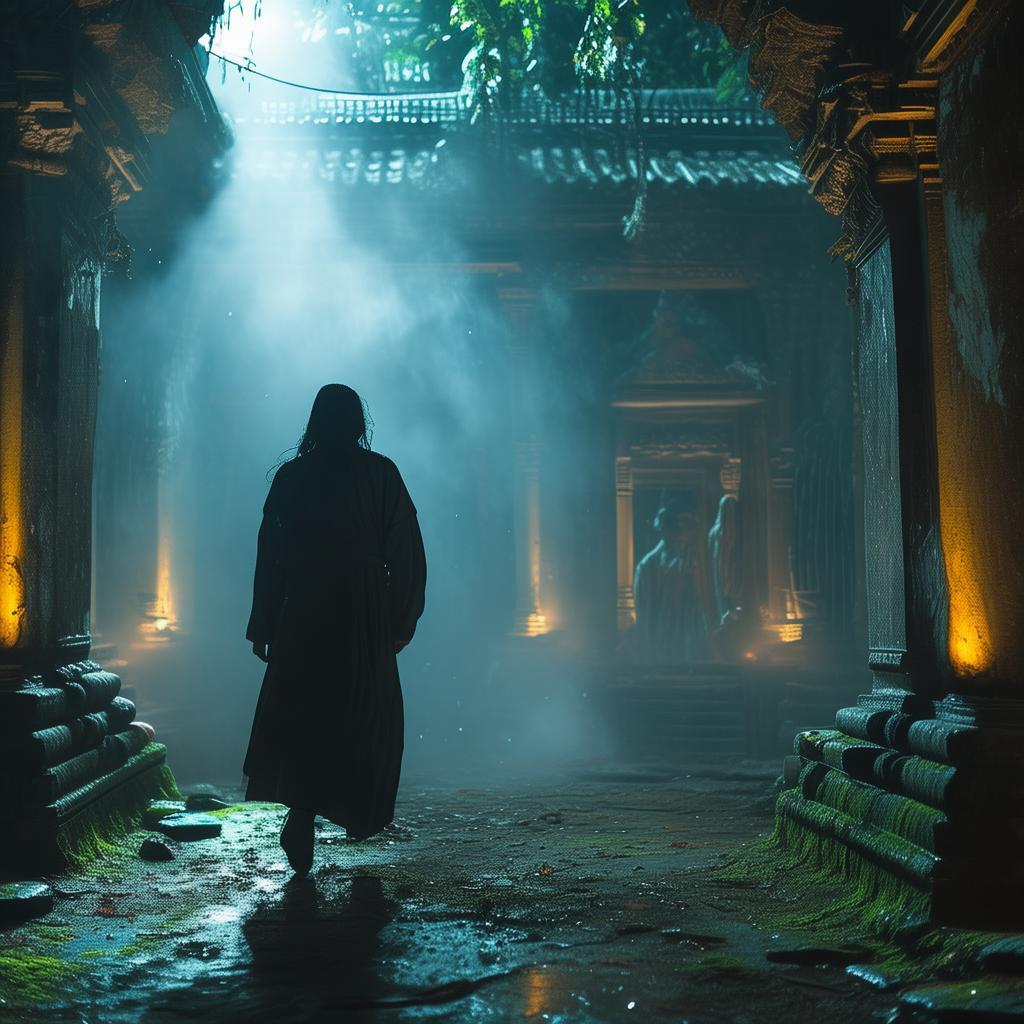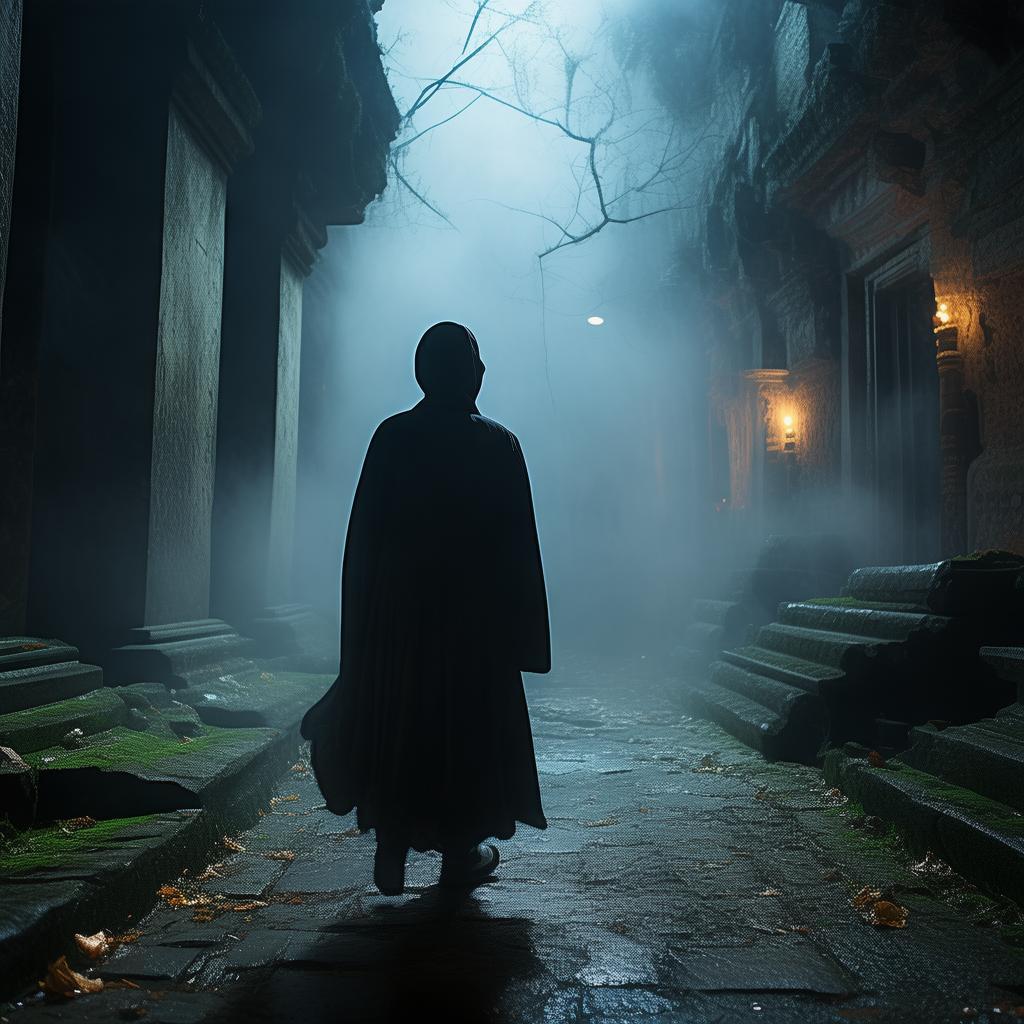The Haunting Symphony: A Tale of Occult Opera and Unseen Forces
The night was shrouded in an eerie silence, the kind that only a city can offer when all is calm. The moon cast a pale glow upon the cobblestone streets of London, where the air seemed to hum with a strange energy. In the heart of the city, amidst the bustle of life, there lay an old, decrepit theater, a relic of a bygone era. This was the venue for The Spectral Symphony, a promotional opera that was said to be imbued with the essence of the occult. It was a production that promised to transcend the boundaries of the ordinary, to pluck the strings of the soul, and to reveal the unseen forces that danced just beyond the veil of human perception.
John Carter, a young and ambitious music critic, had been intrigued by the opera’s premise. His passion for the arts was matched only by his curiosity about the supernatural. As he stepped into the theater, the smell of aged wood and the distant echo of a haunting melody filled the air. The audience was a mix of the curious, the skeptical, and the fervently religious, all drawn by the promise of the extraordinary.
The opera began with a prelude that was unlike any John had ever heard. The music seemed to seep from the very walls, wrapping itself around the audience like a shroud. The performers were masked, their voices echoing through the theater as if they were ghosts from another realm. The story, an adaptation of an old, forgotten legend, spoke of a composer who had sold his soul to the devil in exchange for musical mastery, only to be haunted by the spirits of those he had wronged.

As the opera progressed, John found himself increasingly drawn into its web of terror. The audience around him whispered and murmured, their eyes wide with fear. The performers' movements were fluid, almost ethereal, and the music itself seemed to have a life of its own. It was during the second act, when the composer's past sins were revealed, that the first chilling incident occurred.
John turned to his neighbor, a woman with a pale face and a look of dread, and whispered, "What do you think is happening?"
She shivered and replied, "I don't know, but it feels like something is watching us."
Suddenly, the lights flickered, casting eerie shadows across the stage. The audience gasped, and John felt a cold hand grip his shoulder. He turned to see the woman's face twisted in terror, her eyes wide with unadulterated fear. Before he could react, she vanished, leaving behind only a faint scent of lavender and the sound of her voice echoing in his mind.
John's heart raced as he searched the crowd for her. The theater was a sea of faces, all of them equally terrified. He found himself caught in a web of paranoia, each whisper and creak of the seats a potential sign of the supernatural at work. The third act of the opera was a crescendo of terror, the music growing louder, more intense, as the composer's fate was sealed.
As the final notes echoed through the theater, a sudden chill swept through the room. The lights went out, and John found himself in darkness, surrounded by the sound of his own heartbeat. He reached for his phone, only to find it dead. The air grew thick with fear, and he could hear the whispers of the audience, their voices a cacophony of terror.
Then, a hand reached out and grabbed him by the arm. He spun around, his heart pounding in his chest, only to find the woman from the second act standing before him. Her eyes were wide with terror, and her face was twisted in a grotesque smile.
"Help me," she whispered, her voice barely audible over the sound of his own panic.
John tried to pull away, but the hand was like iron. He looked around, searching for a way out, but the theater was empty. The only sound was the woman's voice, growing louder, more desperate.
"Please, help me," she repeated, her fingers digging into his arm.
Suddenly, the lights flickered back on, and the woman was gone. John was alone, the audience now a distant memory. He sat down on the floor, his breath coming in ragged gasps. The music began to play again, but this time, it was not the haunting melody of the opera. It was the sound of his own heart, pounding in rhythm with the unseen forces that now seemed to be at play.
Over the next few days, John's life spiraled out of control. He experienced vivid dreams of the opera, the composer, and the woman with the lavender scent. He began to see shadows where there should be none, and he heard whispers when there was no one there. The line between the supernatural and the ordinary had been blurred, and John was caught in the middle.
He reached out to his colleagues, hoping to find someone who could help him make sense of the events. One of them, an old friend named Evelyn, agreed to help him investigate. Together, they delved into the history of the opera, the composer, and the legend that had inspired it.
As they pieced together the puzzle, they discovered that the composer had indeed sold his soul to the devil, and that the opera was a manifestation of his dark pact. The spirits of those he had wronged were now bound to the music, seeking retribution.
With Evelyn's help, John began to unravel the mystery. They tracked down the last surviving member of the composer's family, a woman who was said to have been cursed by the composer's deal. As they spoke with her, she revealed the location of the composer's grave, hidden away in an isolated part of the city.
John and Evelyn set out to confront the spirits, determined to break the curse and put an end to the haunting. They arrived at the grave in the dead of night, the moon casting a sickly glow upon the ground. As they approached, the ground beneath them began to tremble, and the air grew cold.
John knelt beside the grave, his heart pounding in his chest. He reached out and touched the cold stone, feeling a strange warmth seep through his fingers. He closed his eyes and whispered, "We come to break the curse. Let the spirits be freed."
As he spoke, the ground beneath him gave way, and a trapdoor opened to reveal a hidden chamber. The spirits of the composer's victims emerged, their faces twisted in rage and despair. John and Evelyn were surrounded, but they did not back down.
"We are here to help you," John said, his voice steady. "Let us break this curse together."
The spirits hesitated, their eyes flickering with uncertainty. Then, one by one, they stepped forward and joined hands with John and Evelyn. The curse was broken, and the spirits were released, their forms dissipating into the night air.
John and Evelyn emerged from the chamber, the air around them still, the haunting melody of the opera no longer echoing in their minds. They had faced the unseen forces, and they had triumphed.
As they walked back to the city, John couldn't help but feel a sense of relief. The opera had been a warning, a reminder of the thin veil that separates the world of the living from the world of the dead. He had seen the truth, and he had survived to tell the tale.
The Spectral Symphony had been a prelude to a greater mystery, one that had tested the boundaries of human perception and the power of the supernatural. John Carter had faced the unseen, and he had come out the other side, forever changed by the experience.
The haunting melody of the opera had been but a whisper, a reminder that the world is full of wonders, both seen and unseen. And as John looked up at the night sky, he knew that there was much more to life than what met the eye, and that the line between the ordinary and the extraordinary was far more blurred than he had ever imagined.
✨ Original Statement ✨
All articles published on this website (including but not limited to text, images, videos, and other content) are original or authorized for reposting and are protected by relevant laws. Without the explicit written permission of this website, no individual or organization may copy, modify, repost, or use the content for commercial purposes.
If you need to quote or cooperate, please contact this site for authorization. We reserve the right to pursue legal responsibility for any unauthorized use.
Hereby declared.









